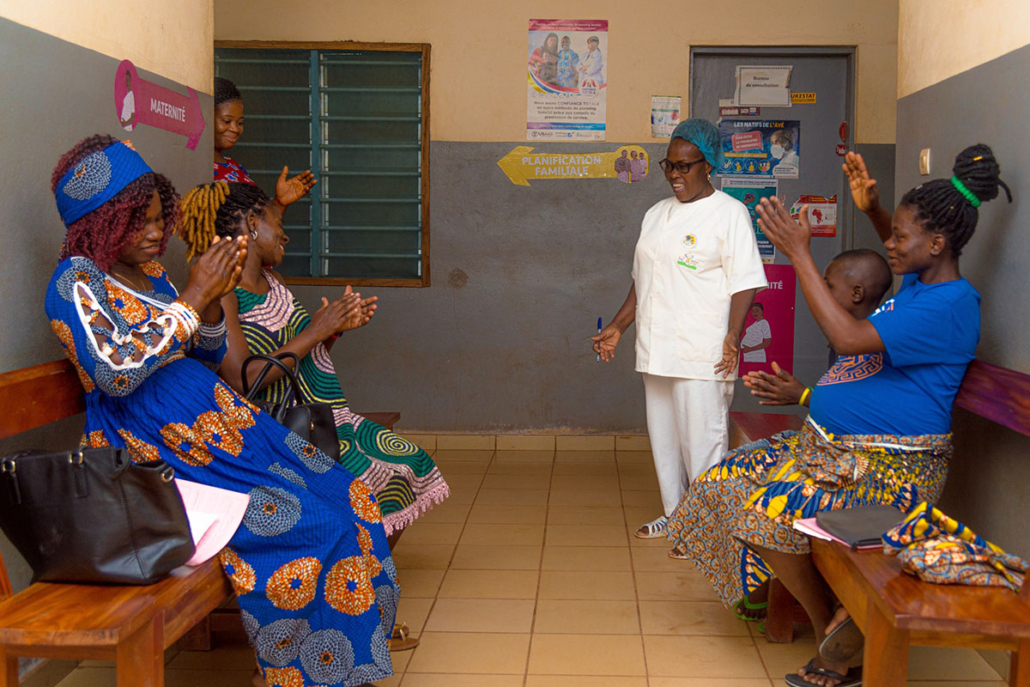Who
A partnership led by Johns Hopkins Center for Communication Programs in collaboration with Save the Children, ThinkPlace, ideas42, and Camber Collective, and the Amplify-Family Planning service delivery project.
What
A buy-in under the Breakthrough ACTION project, funded by the USAID West Africa Regional Health Office to support social and behavior change (SBC) programming for family planning in West Africa.
When
July 2018 to March 2025
Where
Burking Faso, Côte d’Ivoire, Niger, and Togo (2018-2023) and Cameroon, Mauritania, and Togo (2023-2025)
Why
To support technically sound SBC programming for family planning in West Africa and contribute to the Ouagadougou Partnership’s goal to reach 13 million family planning users by 2030.
The West Africa Breakthrough ACTION (WABA) project works to increase informed, voluntary family planning and reproductive health service use among women, men, youth, and couples in urban and periurban areas of Burkina Faso, Côte d’Ivoire, Niger, and Togo. Alongside national, local, and implementing partners, WABA strengthens stakeholder capacity to design, implement, and evaluate social and behavior change programs for family planning; improve family planning service communication, trust, and quality; and reduce social and individual barriers to adopting priority behaviors, including couple and intergenerational communication about family planning.
The project also made considerable strides in addressing gender norms that regularly prevent men’s involvement in family planning and reproductive health, strengthening the role of religious leaders in promoting reproductive health, overcoming taboos to increase community support for youth family planning and reproductive health information and service access, and promoting empathetic care for all family planning clients. Throughout, WABA collaborated with local partners, associations, and community leaders to design and implement these activities, allowing the effects of these activities to continue beyond the life of the project.
SBC Capacity Strengthening
In each of the four implementation countries, WABA worked to improve government and civil society capacity to coordinate, design, implement, and monitor effective family planning and reproductive health (FP/RH) SBC programs at the national and sub-national levels. This included improving coordination among national SBC working groups, conducting FP/RH stakeholder mapping, harmonizing FP/RH messages, increasing gender considerations in local and national FP/RH programs, and strengthening SBC for FP/RH capacity. WABA successfully established or revitalized SBC working groups in Côte d’Ivoire, Niger, and Togo; due to government changes, a working group was never established in Burkina Faso. WABA also supported Costed Implementation Plan review, development, and validation in Côte d’Ivoire, Togo, and Niger.
- A Taxonomy for Social Norms that Influence Family Planning in Ouagadougou Partnership Countries [ English | French ]
- Gender Equality Check-In Tool [ English | French ]
- Mapping Implementers Working in Family Planning and Reproductive Health in Togo
- Strengthening Social and Behavior Change Monitoring and Evaluation for Family Planning in Francophone West Africa (Breakthrough RESEARCH)
- SBC Checklist to Develop and Assess Costed Implementation Plans for Demand Creation
Family Planning Service Impact
WABA supported improved FP service communication in selected Integrated Learning Networks and communities (catchment areas) in each country. The project designed campaigns to increase local trust in FP methods and services and led community dialogues about FP service quality and subsequent health center walkthroughs that invited community decision-makers to observe service delivery challenges first-hand and design plans to address them. Alongside FP clients, providers, and other stakeholders, WABA also co-designed solutions to enduring FP service delivery challenges in each country, addressing issues like FP client flow through services, providers’ empathy for their FP clients, and FP client counseling.
Family Planning Social Barriers Impact
The project contributed to reducing social and individual barriers to the adoption of priority behaviors such as talking more openly about youth FP/RH needs and experiences and increasing youth access to FP/RH information and services. WABA worked alongside a cohort of young people from the francophone sub-Saharan Africa region to develop a regional multimedia campaign called Merci Mon Héros (Thank you, my hero), which provided real-life examples of everyday “heroes” who overcame taboos to offer young people access to FP/RH information and services.
Research, Monitoring, Evaluation, and Learning
Across all its activities, WABA conducted research studies, monitoring activities, and learning exercises to gauge the activities’ impact on project outcomes of interest, including the use of FP/RH services, modern FP method uptake, and intermediary contributors such as intention to use services, couple and intergenerational communication about FP/RH, and more. The project collaborated with Breakthrough RESEARCH to gather additional information and document other WABA results.
- Assessing exposure to Merci Mon Héros and associated outcomes in Côte d’Ivoire and Niger
- Client-facing materials and counseling aids: Literature review executive summary [ English | French ]
- Community Empathways Dialogue Results Brief
- Evaluation of the Confiance Totale Campaign in Togo
- Implementing and Innovating Upon Best Practices for Family Planning and Reproductive Health Results: Experiences from West Africa Breakthrough ACTION
- Informer les Programmes de Changement Social et de Comportement en Utilisant l’Ecoute Sociale (Breakthrough RESEARCH)
- Monitoring the Quality Assurance Branding Campaign Confiance Totale in Côte d’Ivoire [ English | French ] (Breakthrough RESEARCH)
- Social Media Listening and Evaluating the Impacts of a Regional Mass Media Intervention Targeting Young People (Breakthrough RESEARCH)
Webinars
The Harnessing Compassion to Improve Family Planning and Reproductive Health Outcomes webinar series aimed to highlight approaches West Africa Breakthrough ACTION used to build rapport, trust, and common ground between health care providers, families, and community leaders for better health outcomes.
- How can client-provider interactions be improved to increase the quality of FP/RH services? [ French recording | Slides ]
- How do you build community trust and create ongoing support for FP/RH services? [ French recording | Slides ]
- How can you ensure frank communication on FP/RH with young people? [ French recording | Slides ]






